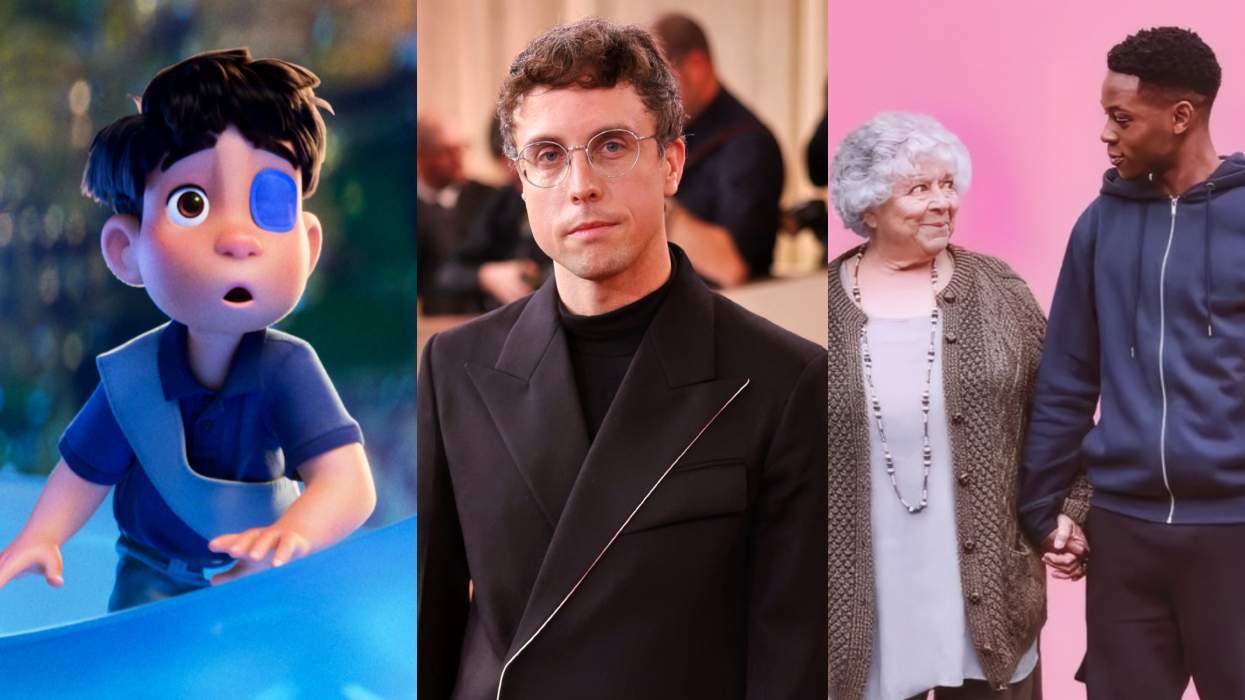Is it possible that a sinister strategy that worked so well for Republicans in election cycle after election cycle -- throwing out antigay red meat to its ravenous, energetic, evangelical base -- could actually, finally be the party's undoing? Pointing to the GOP's nasty, homophobic actions could actually work in the Democrats' favor.
Let's take a case in point: the 15th annual Human Rights Campaign dinner, held in October. There's no question we were all stoked when President Obama, speaking to the group for the second time in his first term, came out swinging against Republicans by standing up for a gay soldier who was booed by audience members at a GOP presidential debate.
Stephen Hill, who is serving in Iraq, was among those asked to present questions to the candidates during the Fox News-Google debate in Orlando, Fla., in September. He identified himself as gay and asked former U.S. senator Rick Santorum if he would bring back "don't ask, don't tell." Before Santorum could give his answer (which was a resounding, ugly "yes!") audience members booed at Hill's mere mention of the fact that he is gay. Neither Santorum nor any of the other candidates stood up to the bigotry at the event.
"We don't believe in the kind of smallness that says it's OK for a stage full of political leaders -- one of whom could end up being the president of the United States -- being silent when an American soldier is booed," Obama stated passionately, as the crowd at the Washington Convention Center in D.C. roared and leapt to its feet. "We don't believe in standing silent when that happens. We don't believe in them being silent since. You want to be commander in chief? You can start by standing up for the men and women who wear the uniform of the United States, even when it's not politically convenient. We don't believe in a small America. We believe in a big America -- a tolerant America, a just America, an equal America -- that values the service of every patriot."
The comments were noteworthy not just because Obama forcefully blasted the GOP after almost three years of "reaching out" but also because the rest of the president's speech was cautious and lackluster. He touted his achievements for LGBT Americans -- many of which came only after hard pushing by activists -- and laid out no concrete plans for equality in the future. Nor did Barack Obama "evolve" (his word) on marriage equality, as some had hoped he would.
The fact that a president who is timid about both taking on the GOP and loudly advocating for LGBT rights hit so hard against the Republicans over their hostility toward a gay soldier was quite telling: Even Obama's cautious campaign handlers saw it as an easy win.
It's yet another indication of how vulnerable Republicans are on the gay issue, captive to their increasingly extreme base while the American mainstream is moving forward rapidly. And it's something Democrats and the media should pick up on, point out forcefully, and run with. The president and his advisers might have thought this was a safe bone to pick because it involved chastising the Republicans on the issue of patriotism and attacking our troops serving overseas. But the booing would not have taken off as a controversy and outraged so many Americans if a majority had not also come to believe -- as the polls have shown us -- that gay and lesbian Americans should have full civil rights.
Indeed, all of a sudden Republicans would rather not talk about gay rights, after years of using it as an issue to fire up their base. Look at the GOP debates for evidence. Not until the Fox News-Google debate, the seventh one, which solicited questions from Americans online, did we see LGBT issues raised much at all, including the issue of marriage, during a time when New York became the sixth and most significant state to allow gays and lesbians to marry. At both the MSNBC-Politico debate at the Reagan Library in California and the CNN-Tea Party Express debate in Tampa, Fla., both of which took place in September, there was no discussion of any kind about gay issues.
It's true that it's up to the moderators to ask, but the campaigns offer up question topics, and during the debate candidates can shift discussion to focus like a laser beam on an issue a candidate prefers -- like the HPV vaccine, health care, taxes, or immigration.
MSNBC's Chris Matthews called out the former Pennsylvania senator and moral crusader Rick Santorum on his not bringing up gay issues during the debate at the Reagan Library: "You know, senator, candidates know how to take a question and give the answer they want. The smart politician gives a quick answer to the question, then says what they want to say. Nobody used that technique tonight to bring up 'don't ask, don't tell' and to support it, nobody came out against same-sex marriage tonight.... It seems like your party believes that you can't win this general election if you talk about same-sex marriage."
Born-again Michele Bachmann, a darling of the Christian right when she was a Minnesota state legislator who tried to get a marriage amendment passed, didn't want to discuss her antigay positions with reporters throughout the early part of the campaign, when she was surging in the polls and trying to appeal to the mainstream. She wanted to discuss her husband Marcus's "pray away the gay" program at his Christian counseling centers even less. Only when her candidacy plummeted did she begin publicly addressing gay issues, desperately turning to the religious right to jump-start her dead campaign. Republicans seem to now see the gay issue as one with niche appeal in their party and as a loser in the mainstream.
The history of the Defense of Marriage Act is yet another example. Ever since the Department of Justice decided not to defend DOMA, leaving it to Republicans in Congress to hire a lawyer to do so, House speaker John Boehner, in statement after statement, has treated defending DOMA more like a chore than something he's passionate about. It took almost two weeks after the DOJ announced in February that it would not defend DOMA for Boehner to affirm that the House would do so. He made the announcement on a Friday, certain the news would be lost in the media coverage over the weekend.
Even then, Boehner didn't state his rationale by railing that traditional marriage needed to be "defended" against gays. Instead he couched the action as a duty to defend a law and charged that the president "has opened this divisive issue." Boehner had the House Bipartisan Legal Advisory Group -- which has a Republican majority -- vote (3-2) to defend DOMA rather than taking it to a vote of the full House, knowing that many of his members would not want to be on the record supporting it.
Boehner has been on the defensive ever since. Six House Democrats spearheading the DOMA repeal have demanded a briefing from the outside counsel the House hired, former Bush solicitor general Paul Clement, pointing to his use of arguments that are based on antigay junk science and opinion. "It's incumbent upon all lawyers...to undertake representation in an objective manner that is factual and legally supportable," their letter notes. "Unfortunately, the outside counsel that you have retained filed pleadings containing arguments and assertions that are troubling and appear to fall short of this standard."
When the House in September tripled the cap for Clement's fee -- to $1.5 million, in a time of economic hardship -- Democrats pounced again. Boehner ducked and ran for cover, and he had his spokesman put out weak statements about how the DOJ should be covering the cost. But he clearly knew he's got to feed the extremist beast.
The defensiveness is all the more reason why President Obama, if he wants to capitalize on the issue, needs to evolve on marriage now. He has nothing to lose (most of those opposed to marriage equality are already opposed to him) and everything to gain, as the Democratic Party base and the LGBT community would be enthusiastic, working in full force to get him reelected at a time when polls show Democratic voters to be disillusioned. More so, the president should be speaking out on anti-gay marriage amendments in Minnesota and North Carolina, and pointing to the GOP's recklessness, intolerance, and waste of taxpayer dollars at this time.
With the GOP on the ropes over gay issues, it's time for Democrats to deliver a knockout punch and end its political gay-bashing once and for all.















Charlie Kirk DID say stoning gay people was the 'perfect law' — and these other heinous quotes
These are some of his worst comments about LGBTQ+ people made by Charlie Kirk.